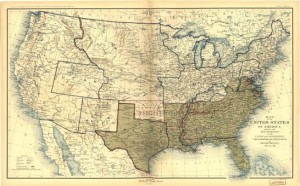 In Louisiana, Union forces continue their campaign up the Red River, placing ever more pressure on Confederate forces in the area. Meanwhile, in the Eastern theater of war, the 102nd Illinois Regiment moves out from Lookout Valley, straddling the Tennessee and Georgia state lines, on a scouting expedition southwest-ward to Deer Head Cove, Georgia, near the Alabama line. Union Gen. William Tecumseh Sherman is feeling out the Confederates as he prepares for the offensive against Atlanta.
In Louisiana, Union forces continue their campaign up the Red River, placing ever more pressure on Confederate forces in the area. Meanwhile, in the Eastern theater of war, the 102nd Illinois Regiment moves out from Lookout Valley, straddling the Tennessee and Georgia state lines, on a scouting expedition southwest-ward to Deer Head Cove, Georgia, near the Alabama line. Union Gen. William Tecumseh Sherman is feeling out the Confederates as he prepares for the offensive against Atlanta.
Northward, Wisconsin native the Rev. J. W. Osborn, Jr. (born 1838) is ordained to the Baptist ministry. The story of Osborn’s path to the ministry is peculiar enough to read like a novel. He traveled with his parents from Wisconsin to California during the gold rush of the late 1840s. Unlike the vast majority of fortune seekers, Osborn’s dad–a Baptist preacher, as had been his father–really did strike gold “and the Osburns returned to the east a little later taking with them a gunnysack filled with the precious metal, going by the way of the Panama canal.”
The family subsequently settled in Iowa, where the Osborn fortune was used, in part, to put the young man through school at Central University in Pella, a Baptist institution of higher education that had been founded in 1853 by Dutch Baptist pioneers who had immigrated to America to escape religious persecution in the Netherlands. Osborn was among the school’s earliest graduates.
Osborn is a Baptist whose ministry and life is not directly impacted by the war, yet for whom the war provides new opportunities in the aftermath of the United States’ victory over the Confederate States.
The “call of the west” remains with Osborn, leading the tall, lanky preacher in 1866 to once again “cross the plains.” Union victory has cleared the way for easier and safer westward migration, and Osborn, in his second western foray, settles in Oregon, becoming one of the earliest Baptist ministers in the state.
Marrying Cynthia Jane Adams in 1873, Osborn remains in Oregon for the remainder of his life, raising two daughters and eventually settling on a farm near Independence. For many years he ministers among the Baptists of Oregon, helping establish dozens of churches in Polk, Linn and Marion counties, and then helping them grow.
Osborn’s life spans the conquering of the west.
Upon his death in 1919, Osborn’s obituary begins thus:
The character of a picturesque and venerable character of the west–which has faded into oblivion–was brought to a close Monday when the spirit of Rev. J. W. Osborn took its flight to its maker at the family home a few miles south of Independence. Six feet five inches in height and with long flowing beard, Rev. Osborn occupied a venerable place in the hearts of hundreds of Polk, Linn and Marion county people.
He belonged to the old west. Simple in tastes, strong in character and staunch in fidelity. An ordained Baptist preacher of nearly 60 years, he spent his life in doing good. Much of his work was done without monetary recompense, and his efforts were confined largely to pioneering in spreading the gospel. While he had regular charges at times he preached at a multitude of places, some regularly and others intermittently.
Sources: “102nd Regiment, Illinois Volunteers,” National Park Service (link); “Long Ministerial Career is Ended: Rev. J. W. Osborn Dies at Home South of Independence,” Osborn obituary, Donner Summit Historical Society, Norden, California (link); “Central History,” Central College (link); Charles Hiram Mattoon, Baptist Annals of Oregon: 1886-1910, Volume 2, McMinnville, Ore.: Oregon Baptist State Convention, 1913, pp. 35, 45, 49, 51, 56, 57, 207, 314, 316, 317, 363, 378, 476, 481 (link)


